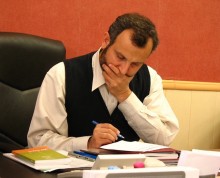The recent revelations in the Church have sparked an outcry. Following Archbishop Vigano’s document, something not far short of a witch hunt has ensued. Fingers have been pointed — in some cases perhaps too hastily — and indictments have been leveled and treated as proven convictions with the distinction between these two terms largely being ignored. Notwithstanding this, however, and more importantly, something is being done about a serious problem in the Catholic Church; a problem that needs rooting out. Perhaps, then, when this is all over, we will look back and thank God for the reform brought about by these terrible revelations.
But this should give us pause, a long, serious pause, because reform is not simply change. Change merely indicates a divergence from what came before. Change speaks of a “new road” but doesn’t specify where that road goes or why we are on it. Reform adds the notion of improvement, a purposeful and clear direction to the new path chosen. And what might that improvement look like? What lies on that path? What could be done to prevent atrocities such as these from occurring again?
Like anyone looking for the remedy, one must find the cause. So what was the primary cause of this evil? Among the contributing factors, one in particular stands out above the rest. Silence. Silence is what allowed such evils to spread within the very heart of the Church. Who exactly was silent and what punishment they ought to pay is a job I choose to leave to the Divine Judge and those investigating the accusations.
But it is silence that has been the cause of such scandal. So, when looking to reform, what can be done to give the members of the Church, all of its members, the courage to speak? As in all things and particularly in this case, we must pray. But that is not always the only thing we are capable of doing. As Fr. Gabriel of St. Mary Magdalene says in his book Divine Intimacy, “Grace can give courage even to those who are naturally timid; but we must not expect grace to do this without our cooperation. The virtue of fortitude has been given to all Christians, and in this sense is an infused virtue; however, it remains for us to activate it by practice, and in this sense it becomes an acquired virtue… We become humble by making acts of humility; likewise, we become strong and courageous by performing courageous acts.”
So easily spoken and yet so difficult to perform. If Fr. Gabriel is right in what he says, we must, as combatants in the battleground for souls, endeavor with all our strength to perform these courageous acts. But silence is a powerful foe, and we have all too recently seen the havoc it can wreak. So we must act and act now.
However, simply telling people to “speak up” is not usually enough. So what more can be done? The answer is not further indictments (though justice must be paid) or creating a new set of policies. While these things can certainly help, they do not get at the core issue. It is actually more fundamental, and simpler, than these. The answer is a focused effort to improve the organizational health of the Church. If you have ever heard of Patrick Lencioni, that phrase may sound familiar.
Now because I work for a consulting firm that specializes in this, if this answer seems a little self-serving, hear me out. Nothing stifles the mission of the Church more than its interpersonal dysfunction. The Church is pervaded by an attitude that we must always adhere to the principle of being “Catholic nice.” And this “Catholic-nice” talk, strangely, takes two polar opposite forms with rarely a healthy middle-ground. One is the deflated, guarded conversations that occur when real decisions ought to be made during meetings. The other, conversely, is the backstabbing, personal attacks that occur outside those meetings (usually in parking lots). This has created an environment of hostility to openness and trust unrivaled in any other professional industry.
So what gives? Does the Church just hire mean people? Far from it. But for some reason, people in the Church today see conflict— yes, I dared to say that terrible word — as something uncomfortable and therefore to be avoided at all cost. But without good, healthy conflict (call it debate if that makes it more palatable; the idea is the same), issues and concerns of all forms slip by and slide further and further out of control. Rarely do serious failures and scandals result from a single person’s poor decision or silence. Rather, it is an avalanche effect that starts with just that one pellet of snow, that one voice unwilling to speak up. If uncontested, this avalanche of silence soon envelops everything and everyone. Without the ability to speak about what matters most, the Church and her mission become paralyzed. Or worse than paralyzed, as we all know.
In a June article by USA Today listing the top worst 18 companies to work for, even the quickest glance at the article reveals a couple interesting things. The first is that the kind of work a company does is in no way indicative of a healthy work environment. The companies on this list range from grocery store chains and fitness centers to software and customer service corporations. Yet all of them have incredibly low employee ratings. The second is that the employees of these companies often express a lack of trust in the direction of the senior leadership of the company (sound familiar?) and an unstable, often hostile, work environment. Now because of this dysfunction, those companies are the worst for it, regardless of how good their products or services are. Similarly, if the “organization” in charge of spreading the Gospel message operates like your local DMV, the message itself will suffer.
“The only thing necessary for the triumph of evil is that good men do nothing.” Perhaps if we changed the quote slightly so as to say “The only thing necessary for the triumph of evil is that good men do and say nothing,” then it becomes particularly well-suited for us today. How, given recent events, could we say otherwise? It is the job, then, of those in leadership positions in the Church to guide the faithful fold away from these rocky pastures. Prelates are called specifically to lead and direct the Church. When their brothers fail, it is their duty to show that the Church, though comprised of fallen men whose actions in this case are atrocious, must still move forward with new purpose to proclaim and sustain the teachings of Jesus, whether “in season (or) out of season.”
Over the next few weeks, we at Evangelium Consulting hope to write a few more articles outlining some more practical ways to overcome the fear of conflict, drastically improve team cohesiveness, and even revolutionize meetings. I pray you will receive it with open hearts and minds.
St. Joseph, Patron of the Universal Church, pray for us in our hour of need.















